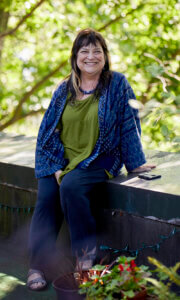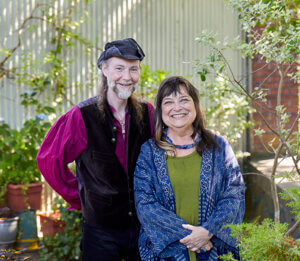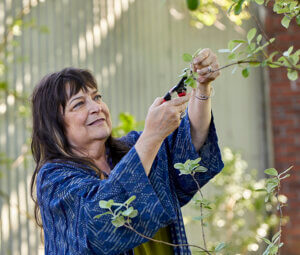 When the need for dialysis became a reality for Julia Sterkovsky, she chose Peritoneal Dialysis (PD), twice.
When the need for dialysis became a reality for Julia Sterkovsky, she chose Peritoneal Dialysis (PD), twice.
The first time was in 1999. She liked the consistency it provided and appreciated the fact that she can do it herself. “It’s more like the way a healthy kidney works,” she says. She received a transplant at the beginning of 2001 after two years of PD.
Dialysis became necessary for her a second time in September 2019 when her transplanted kidney lost some of its capacity, and she began on PD again. Currently Julia does three PD treatments a day; typically PD patients do five to six fluid exchange treatments daily. She’s supported at home by her husband Brian, who helps with the logistics of her care, and their two cats, Granuaile and Balthazar, also provide support.
She prefers PD because she knows it keeps her feeling on an even keel and well enough to work. And her work is important, not only to her but to all of us.
For the past 24 years, she has been the Executive Director of the Seattle Human Services Coalition (SHSC), a policy and advocacy organization that focuses on equity and fairness for people in Seattle and King County, which can mean anything from pursuing big ideas that can forward society to championing fundamental causes of the underrepresented and underserved, such as housing and opportunity.
Kidney disease does add more pressure to life she says, but “the choice of how to deal with it is yours. If you want to live, these are your choices.”
Julia is one of small percentage of people with kidney disease who can’t point to a specific cause for her kidney disease. However, her mother had nearly the same experience at about the same age, so a genetic cause is the obvious suspect. Her mother in fact was a home patient in Ohio in the 1970s.
The student becomes a master
She really appreciated the PD training she got from nurses in Northwest Kidney Centers’ Home program before her second round with PD.
“The training was excellent. So helpful. Everyone was compassionate and understanding,” she says. “They make you feel comfortable and secure.”
She’s quite capable and fine doing exchanges at her desk in her work office but has liked the flexibility of being able to do them at work from her desk at home during COVID. Like all Home program patients, Julia meets with her care team in-person monthly following training, where she continues to gain insight into her treatment.
Julia’s “an amazing patient because she stays on top of her health and treatments,” says Liz Ong, her social worker at Northwest Kidney Centers. “She also has the best smile and laughter that’s super contagious.”
Not too long ago, Julia was in the hospital for a non-kidney situation and found herself updating the hospital staff on the latest PD procedures. She reports that the hospital team was sincerely appreciative that she could help them keep up on best practices because of her excellent training from NKC.
‘Like learning to drive’
The thing about PD she says is “you’re in control, and that can be daunting. You have to make decisions, keep track, be careful. But it’s also good to be in control.”
The ins-and-outs of PD reminded Julia of learning to drive. She recalls “being in driver’s education class with all sorts of new information being thrown at you, and then actually driving with so many things to track on the road and on the dashboard. And then a week later it seems like you can remember all of those things pretty easily. It becomes second nature.”
One of Julia’s big ideas: Opting out of organ donation
Despite her facility with PD, she’s ready for another kidney transplant. Despite her being an easy match, she’s been on the waitlist for more than four years; she waited two years the first time. The average wait time for a kidney transplant is three to five years.
True to form, she’s persistent and optimistic. In fact Julia has thought of a way to address the long wait periods.
Her big idea involves a simple change on driver’s license applications. The change would be requiring people to opt-out of being an organ donor rather than having to opt-in. This big idea to give hope to the tens of thousands of people.
 While families would still retain the final say regarding organ donations, this fundamental change would profoundly impact the disproportionate number of people waiting for donated kidneys as well as those in need of other organs. More than 90% of people waiting for organ transplants are waiting for kidneys.
While families would still retain the final say regarding organ donations, this fundamental change would profoundly impact the disproportionate number of people waiting for donated kidneys as well as those in need of other organs. More than 90% of people waiting for organ transplants are waiting for kidneys.
If anyone knows how to bring this idea to lawmakers and the public, it’s Julia. Northwest Kidney Centers has long been a supporter of innovative ideas that improve the lives of kidney patients.
She recently announced her retirement from SHSC. With less time devoted to work, Julia says she’s looking forward to doing more gardening, jewelry work, traveling, writing, and enjoying life with Brian and their cats.
